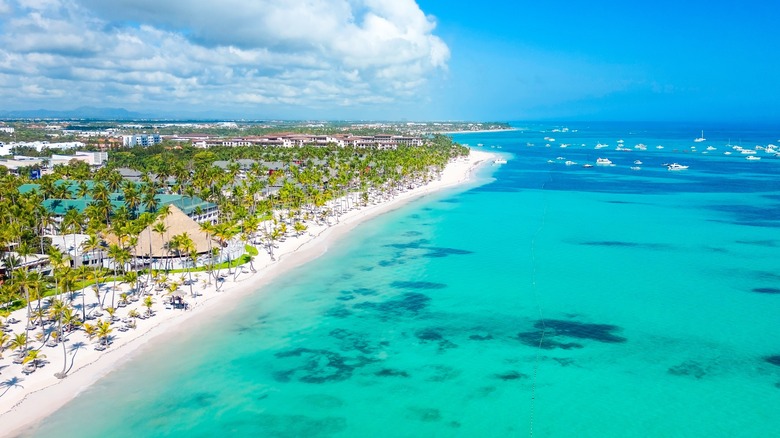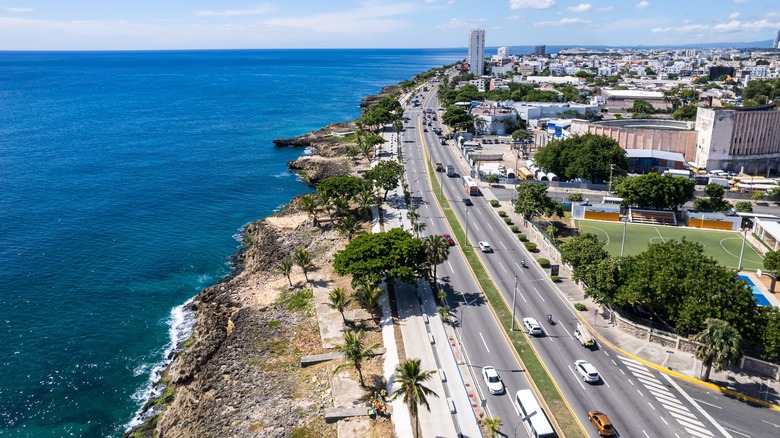The Popular Caribbean Destination Where Food Poisoning Is Common
The Dominican Republic attracts millions of tourists each year, and it's not hard to see why. This Caribbean gem boasts one of the largest water parks in the region and offers a taste of luxury villa life without the luxury price tag. Plus, it also served as one of the filming locations in "Love Is Blind" Season 6, so yeah, it's got some serious pull. But while the Dominican Republic has plenty to brag about, it's also earned a not-so-glamorous reputation for something else: food poisoning. It's unfortunately a recurring issue, especially among tourists.
According to Forbes Advisor's 2023 Holiday Sickness Index, which pored over roughly 2.4 million online forums for keywords like "salmonella" and "E. coli" — two bacteria commonly responsible for the food-borne illness — Punta Cana, a popular resort town, emerged with a travel bug index of 90.4. This unfortunate distinction places it at the top of the list of destinations where tourists have the highest chance of getting sick.
But the problem isn't new. In 2017, CBC reported on a destination wedding in Punta Cana that was derailed when the couple and many of their guests were hospitalized due to "severe food poisoning." And a few years earlier, in 2013, The Guardian detailed a case in which a resort in San Juan was held accountable for the food poisoning of 60 children, resulting in a settlement of over £1.9 million. While the Dominican Republic has undeniable attractions, the risks to your health are something every traveler should be aware of.
Why is food poisoning a recurring problem in the Dominican Republic?
To truly why food poisoning is such a persistent issue in the Dominican Republic, hearing it straight from the travelers who've fallen victim might paint a clearer picture. On IWasPoisoned.com, a site dedicated to collecting anonymous food poisoning reports from across the globe, travelers detail their suspicions about what landed them in misery. One person suspects an "undercooked hamburger" did them in, while another blames "food not kept at proper temperatures." Seafood, lunch buffets, and water also make their way onto the list of likely suspects.
But it's not as if locals are unaware of the issue. Elianet Castillo, an infectious disease specialist at the Medical Center for Diabetes, Obesity, and Specialties (CEMDOE) in Santo Domingo, told Dominican Today that the root cause is pretty simple: poor food handling. "Food poisoning is a syndrome caused by consuming food contaminated with microorganisms, toxins, or chemicals. It is associated with more than 250 pathogens, particularly when food is mishandled," they explained. Gastroenterologist Carmen Cabral added that a lack of proper cleaning before cooking and serving is another key factor that food poisoning is common in the country. "A lot of pesticides are used and the handling from the field to the final consumption destination is too much. Some people think that vinegar is enough," they shared with the outlet. "[The food] should be washed with bottled water, because if you use tap water, we are not at all."
Meanwhile, Robert Quigley, a cardiovascular surgeon, told The Washington Post that travelers often fall ill because they abandon their normal routines during vacation. Whether it's indulging in new activities or being a bit too adventurous with local cuisine, these behaviors can make those with preexisting conditions particularly susceptible to a range of medical concerns — including food poisoning.
How to protect yourself — and your tummy — from food poisoning in the Dominican Republic
Of course, food poisoning isn't exclusive to the Dominican Republic. The World Health Organization reports that nearly 1 in 10 people worldwide contract a food-borne illness annually — about 600 million cases in total. In the United States alone, the Centers for Disease Control and Prevention (CDC) estimate that 48 million people fall victim to such illnesses each year. But if you're heading to the Dominican Republic, you might want to be particularly cautious, since the CDC also warns that traveler's diarrhea is a common affliction among tourists there.
So, what's a traveler to do? First off, the CDC strongly suggests skipping street food, no matter how good it looks. Raw seafood? Not worth the risk. Stick to bottled water for drinking, and although ice at touristy spots is generally safe, don't push your luck in more remote areas. Make sure your food is served piping hot, too, and steer clear of anything that looks like it's been sitting out too long. And yes, wash your hands like your trip depends on it — because it might.
But in case you still get sick despite the precautions, Dr. Partha Nandi, a board-certified doctor of gastroenterology and internal medicine, told Thrillist that bed rest is key and emphasized not hesitating to seek to head to a medical facility if things take a turn for the worse. And for an added boost, a little mental resilience might go a long way. "Mind over matter," they said. "No matter how sick you are, you are only going to feel as horrible as you let yourself feel."


